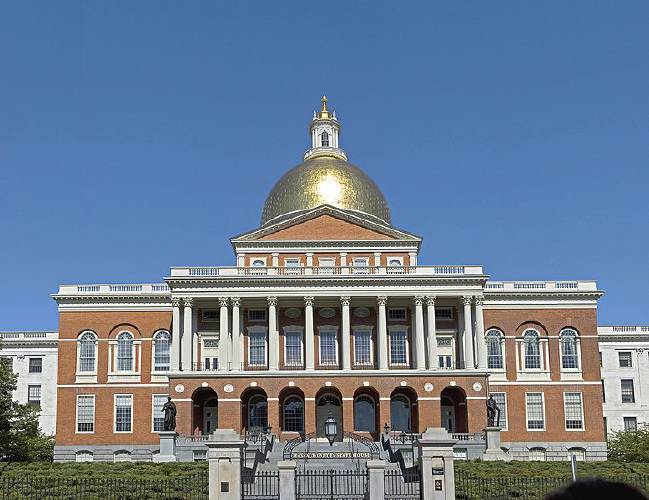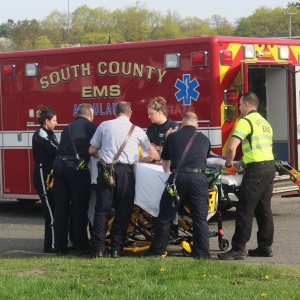Beacon Hill Roll Call: April 7 to April 11, 2025

| Published: 04-18-2025 11:56 AM |
Beacon Hill Roll Call records local representatives’ votes on roll calls from the week of April 7 to April 11. There were no roll calls in the Senate last week.
The House, 140-14, approved and sent to the Senate a $1.3 billion supplemental budget that uses funds generated from the surtax imposed on taxpayers’ earnings of more than $1 million annually to fund $353 million for education-related projects and $828 million for transportation-related ones. It also includes non-surtax spending that pushes the combined bottom line to roughly $1.3 billion.
The surtax was created by voters in November 2022 when they voted for a constitutional amendment that allows a graduated income tax in Massachusetts and imposes an additional 4% income tax, in addition to the flat 5% one, on taxpayers’ earnings of more than $1 million annually. Language in the constitutional amendment requires that “subject to appropriation, the revenue will go to fund quality public education, affordable public colleges and universities, and for the repair and maintenance of roads, bridges and public transportation.”
A total of $818 million of the $828 million for transportation will be used for various MBTA projects while $10 million will fund unpaved roads.
The $353 million for education includes $190 million for circuit breaker reimbursements, which provide financial assistance to public school districts to offset the cost of delivering special education services to students; $50 million for capital improvements at vocational schools; $40 million for the early education and care workforce; $10 million for universal school meals for all public-school students; and $10 million for Green School Works to decarbonize and increase efficiency in schools through clean energy projects.
“Ensuring that every Massachusetts resident has access to a safe and reliable public transportation system, and that every student in the commonwealth receives a high-quality education, are two of the most fundamental responsibilities that we have as elected officials,” said House Speaker Ron Mariano, D-Quincy. “The investments being made in this supplemental budget are representative of the House’s continued focus on meeting those responsibilities and were made possible as a result of years of fiscally responsible, consensus driven budgeting.”
“By further improving our educational and transportation sectors, we will build off the work we have done in the last several budget cycles with a judicious use of the Fair Share funds,” said Rep. Aaron Michlewitz, D-Boston, chair of the House Committee on Ways and Means.
“[The] session was dominated by votes that favored pork barrel spending and neglected support for cities and towns in transportation and education,” said Rep. Marc Lombardo, R-Billerica, who voted against the package. “Moreover, instead of fully funding special education costs that are straining municipal budgets, we allocated hundreds of millions of dollars to the MBTA. Overall, the bill failed to provide comprehensive financial support to communities across the commonwealth. Beacon Hill needs to do better.”
Article continues after...
Yesterday's Most Read Articles
 Northfield man dies in Erving motorcycle crash; Bernardston man injured in Deerfield crash
Northfield man dies in Erving motorcycle crash; Bernardston man injured in Deerfield crash
 Garage, house sustain ‘major damage’ in Phillips Street blaze in Greenfield
Garage, house sustain ‘major damage’ in Phillips Street blaze in Greenfield
 Extension cord under hay ‘being considered a potential factor’ in Leverett house fire
Extension cord under hay ‘being considered a potential factor’ in Leverett house fire
 Lesbian bar opens in Greenfield: Last Ditch is the new space for the Valley’s queer community
Lesbian bar opens in Greenfield: Last Ditch is the new space for the Valley’s queer community
 Real Estate Transactions: May 2, 2025
Real Estate Transactions: May 2, 2025
 New Salem town coordinator stepping down
New Salem town coordinator stepping down
“While the education piece was strong, the transportation piece was not,” said Rep. Joe McKenna, R-Webster. “The stark disparity in funding between the MBTA getting nearly the entirety of funding while the 277 cities and towns without direct MBTA access were effectively left out, was too large a gap to support the bill.”
A “Yes” vote is for the bill.
Rep. Natalie Blais — Yes
Rep. Aaron Saunders — Yes
Rep. Susannah Whipps — Yes
The House, 25-125, rejected an amendment that would reduce funding for the MBTA by $50 million (from $818 million to $768 million) and instead give the $50 million to municipalities for roads using a formula based strictly on each municipality’s local road mileage. Currently, communities receive road funding based on their population, employment and total road miles.
“The amendment would have shifted only $50 million — just 6% out of $828 million — for the MBTA and reappropriate it to Chapter 90 to be allocated based on a town’s road mileage,” said amendment sponsor Rep. Joe McKenna, R-Sutton. “This would have shown a strong commitment from the commonwealth to provide regional equity in transportation infrastructure in all corners of the state.”
A “No” vote is against $50 million for cities and towns.
Rep. Natalie Blais — No
Rep. Aaron Saunders — No
Rep. Susannah Whipps — No
During the debate on the surtax, Rep. John Gaskey, R-Carver, proposed an amendment that would prohibit any public school from allowing a biological male athlete to participate on a girls’ sports team and would also prohibit a biological female athlete from participating on a boys’ sports team. Any school found not in compliance with this ban would forfeit all games that violate the ban.
“For too long Massachusetts has put girls at risk in sports,” Gaskey said. “There have been several instances of boys seriously injuring girls on the field during matches. This is not a transgender issue alone, this is protecting children and creating a system of fair competition. Boys are stronger, faster and more aggressive, and put girls, who are more prone to injury (Harvard study), at greater risk. Massachusetts is putting federal funding at risk by not addressing this requirement as well.”
The House did not vote on the ban itself because Rep. Ken Gordon, D-Bedford, offered a further amendment that would delay the ban from taking place until the Department of Elementary and Secondary Education studies the transgender students in school sports issue. The House approved the delay and essentially killed Gaskey’s bill. The vote was conducted on a voice vote without a roll call.
Gordon said that the issue is not a simple one but rather a complex one, involving issues of federal and state law, and also is the subject of multiple bills that are being considered by the Committee on Education, including one proposed by Gaskey himself. He argued that the study and a public hearing on the ban should be complete before the House votes on it.
In his first speech on the floor of the House, Gaskey called Gordon’s maneuver “a way to bury this and make sure that nobody ever gets this on the record.”
“We don’t need a study on how this is going to affect people,” he said. “We already know this is going to affect people. We already know how many students are going to be affected — every student is going to be affected. Every student athlete will play on the team they were born to play on. That’s what this bill is.”
The Revenue Committee held a hearing on a measure that would give Massachusetts residents the option, on their Massachusetts income tax form, to contribute to a special United Nations Fund — the Least Developed Countries Fund — to help developing countries cope with the effects of climate change.
Supporters say the state income tax form currently features six “tax check-off” options that give residents the option, when filing their state income tax return, to contribute all or part of their tax refund to various causes.
Sen. Mike Barrett, D-Lexington, the sponsor of the bill, did not respond to repeated requests by Beacon Hill Roll Call to explain why he filed the bill.
“Sen. Barrett’s idea is incredibly silly and just shows how out of touch some lawmakers become when they get elected,” said Paul Craney, executive director of the Massachusetts Fiscal Alliance. “As ratepayers see their utility and energy bills increase by 30 to 50% to fund climate mandates passed by the Legislature, the senator wants to send more money to the climate causes.”
Another bill heard by the Judiciary Committee would require the House and Senate Committees on Ways and Means to hold at least three public hearings in Boston, Worcester and Springfield on any legislation referred to them that would increase or expand any existing taxes or fees or establish any new taxes or fees. Each hearing would require at least 14 days’ notice to ensure the public has sufficient time to prepare.
“I am sponsoring this bill because transparency of where taxpayer dollars are going between the Legislature and the public are of the utmost importance currently,” said sponsor Sen. Patrick O’Connor, R-Weymouth. “The sense of trust and understanding between lawmakers and taxpayers sought by this legislation is only possible through thoughtful action to include everyone in the legislative process.”
The Judiciary Committee held a hearing on several bills, including these three:
Eminent domain (H 67): This proposed constitutional amendment would prohibit private property from being taken by the government for private commercial enterprise, economic development or any other private use without the consent of the owner.
“The right to own property is a basic principle of the commonwealth and it is one that I feel should be protected,” said sponsor Rep. Brad Jones, R-North Reading. “I filed this proposed amendment in response to the Supreme Court’s actions in Kelo v. New London, where a majority of the justices ruled against private property holders and determined that the New London Development Commission could take private properties for the purpose of economic development. This is a blatant overreach of government power, and this amendment is an attempt to correct that and protect private property owners in Massachusetts.”
Prohibit gambling on political outcomes (S 1237): This measure would make it illegal to wager on political outcomes, including elections for public office within the state; appointments to public office; the passage, amending or failure of legislative measures; and any other official decision-making processes conducted by political bodies in the state.
Supporters said these platforms and wagering participation are problematic on many grounds, specifically misinterpreting political outcomes. They are commonly mistaken as indicators for who is winning an election when that is not the case.
“Since online gambling was legalized in Massachusetts, political wagering has significantly increased, with billions of dollars generated,” said sponsor Sen. Jake Oliveira, D-Ludlow. “In the 2024 presidential election, over $3.2 billion in wagers were placed on one platform alone. I filed this legislation to ensure stronger safeguards for our election processes and their accuracy. The bill is rooted in preserving the integrity of democratic processes by prohibiting wagering on elections or legislative outcomes, preventing the commodification of our democratic processes.”
Prevent suicide (S 1109): This legislation would criminalize coerced suicide. The measure would impose up to a five-year prison sentence on a person who has actual knowledge of another person’s suicidal ideation, and either coerces the other person to commit suicide, or provides the physical means, or knowledge of such means, to commit suicide.
“I filed this bill in honor of Conrad Roy, a young man who died after his girlfriend Michelle Carter relentlessly pressured him into taking his own life,” said sponsor Sen. Barry Finegold, D-Andover. “Conrad’s Law is a common-sense reform that has support from across the political spectrum. If passed, it will help save lives.”






 Nationwide, beekeepers report loss of 1.6M colonies in 10 months
Nationwide, beekeepers report loss of 1.6M colonies in 10 months Rafters rescued from Deerfield River in Charlemont
Rafters rescued from Deerfield River in Charlemont Antique truck show celebrates 20th year in Deerfield on Sunday
Antique truck show celebrates 20th year in Deerfield on Sunday Petting zoo brings joy to families in Orange
Petting zoo brings joy to families in Orange
